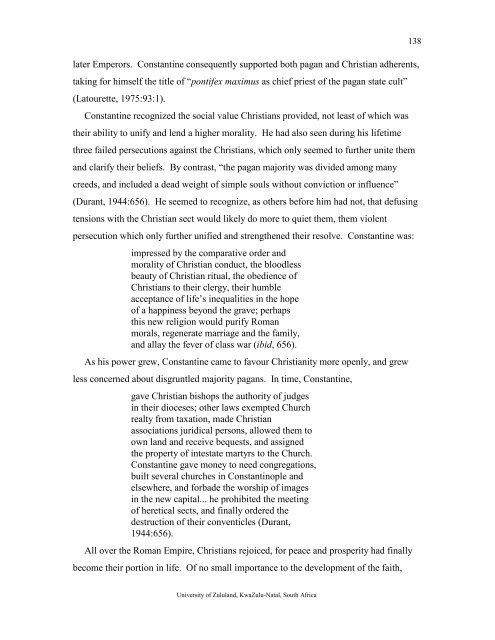Haase_UZ_x007E_DTh (2).pdf - South African Theological Seminary
Haase_UZ_x007E_DTh (2).pdf - South African Theological Seminary
Haase_UZ_x007E_DTh (2).pdf - South African Theological Seminary
Create successful ePaper yourself
Turn your PDF publications into a flip-book with our unique Google optimized e-Paper software.
later Emperors. Constantine consequently supported both pagan and Christian adherents,<br />
taking for himself the title of “pontifex maximus as chief priest of the pagan state cult”<br />
(Latourette, 1975:93:1).<br />
Constantine recognized the social value Christians provided, not least of which was<br />
their ability to unify and lend a higher morality. He had also seen during his lifetime<br />
three failed persecutions against the Christians, which only seemed to further unite them<br />
and clarify their beliefs. By contrast, “the pagan majority was divided among many<br />
creeds, and included a dead weight of simple souls without conviction or influence”<br />
(Durant, 1944:656). He seemed to recognize, as others before him had not, that defusing<br />
tensions with the Christian sect would likely do more to quiet them, them violent<br />
persecution which only further unified and strengthened their resolve. Constantine was:<br />
impressed by the comparative order and<br />
morality of Christian conduct, the bloodless<br />
beauty of Christian ritual, the obedience of<br />
Christians to their clergy, their humble<br />
acceptance of life’s inequalities in the hope<br />
of a happiness beyond the grave; perhaps<br />
this new religion would purify Roman<br />
morals, regenerate marriage and the family,<br />
and allay the fever of class war (ibid, 656).<br />
As his power grew, Constantine came to favour Christianity more openly, and grew<br />
less concerned about disgruntled majority pagans. In time, Constantine,<br />
gave Christian bishops the authority of judges<br />
in their dioceses; other laws exempted Church<br />
realty from taxation, made Christian<br />
associations juridical persons, allowed them to<br />
own land and receive bequests, and assigned<br />
the property of intestate martyrs to the Church.<br />
Constantine gave money to need congregations,<br />
built several churches in Constantinople and<br />
elsewhere, and forbade the worship of images<br />
in the new capital... he prohibited the meeting<br />
of heretical sects, and finally ordered the<br />
destruction of their conventicles (Durant,<br />
1944:656).<br />
All over the Roman Empire, Christians rejoiced, for peace and prosperity had finally<br />
become their portion in life. Of no small importance to the development of the faith,<br />
138<br />
University of Zululand, KwaZulu-Natal, <strong>South</strong> Africa

















